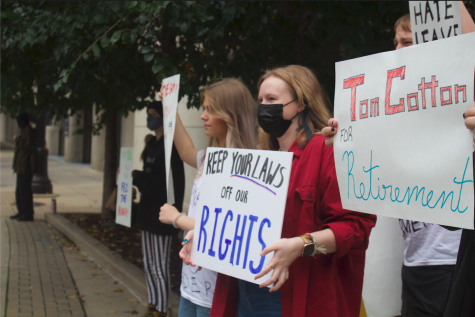Four new charges in Flint water investigation
The criminal investigation into the Flint water crisis has made visible progress for the first time in months as Michigan Attorney General Bill Schuette charged four people with crimes related to the case on Tues., Dec. 20.
Darnell Earley and Gerald Ambrose, former Flint emergency managers, are charged with false pretences, conspiracy to commit false pretenses and willful neglect of duty in office.
Howard Croft, former director of the Flint public works department, and Daugherty Johnson, former Flint utilities administrator, are also charged with false pretenses and conspiracy to commit false pretenses. Both of these charges are felonies punishable by 20 years in prison.
The attorney general’s office has alleged that the four men were involved in a conspiracy to “manufacture a calamity” that would allow the city to borrow money to finance the switch to the Karegnondi Water Authority (KWA) pipeline.
The city of Flint was indebted to the point that it was not authorized to borrow any more money, unless the city needed to “remedy a calamity.” Schuette’s office claims that the Flint officials lied about the purpose for the bond deal, which they secured under the false pretense that it would be used to clean a retention pond. Instead, the officials intended the money for the KWA pipeline deal.
As a part of the KWA pipeline deal, these same officials were involved in the agreement to use the Flint River as a temporary water source in the interim between the city’s termination of the Detroit water system contract and the completion of the KWA pipeline.
The attorney general alleges that Earley was repeatedly warned that the Flint water plant was unfit for the task of providing safe drinking water, and yet Earley went forward with the switch to using the Flint River, treated by the Flint water treatment plant, despite this knowledge.
Earley served as Flint’s emergency manager, appointed by Gov. Snyder, from September 2013 to January 2015. The city switched to the Flint River for its water source in 2014.
Earley has pleaded not guilty, claiming that city workers told him they would be able to treat the water to be safe to drink. In statements before Congress last year, Earley claimed Howard Croft, who is among the four recently arraigned, told him the river “could and would be treated to meet safe drinking water standards.”
While Darnell Earley oversaw the city’s switch over to using Flint River, Earley has also pointed out that the decision to make the switch was made prior to his appointment to emergency manager. He has claimed he merely executed the plan that was handed him by the previous emergency manager, Ed Kurtz, and the Flint City Council.
The decision to switch from the Detroit water system to the KWA pipeline was approved by the Flint City Council in 2013. According to former mayor Dayne Walling, though, the decision to switch to KWA did not involve the decision to use the Flint River as the city’s interim water source. Walling claims that Kurtz, the emergency manager at the time, made that decision without a vote from the Flint City Council, who technically did not have any power under the emergency manager laws.
However, the report also states that Snyder’s legal counsel and senior aides met with Earley in 2014 to discuss switching back to the Detroit water system, but that Earley had countered by saying that the water quality problems would be fixed and going back to the Detroit system would be too costly.
Gerald Ambrose, the emergency manager who replaced Earley, is charged with the same felonies as Earley. His warrant also states that he had knowledge that water plant could not produce safe water, yet entered into contracts to continue using that water.
During his time as emergency manager, from January to April 2015, Ambrose also rejected a Flint City Council vote to return the city to the Detroit water system.
The Detroit Water and Sewage Department (DWSD) wrote to Earley offering the city an immediate switch back to the DWSD system in Jan. 2015, just before the end of his tenure as emergency manager. He claims to have never received the letter, though the investigation reports evidence that he discussed the letter with then mayor Dayne Walling.
The Flint City Council then forwarded the letter a second time to Ambrose in Feb. 2015, who also rejected the offer. MLive reports that Ambrose wrote to the council saying, “No [matter] how many times you send it to me, it doesn’t change the cost (or my mind).”
According to the warrant request for Daugherty Johnson, former utilities administrator, Johnson and Croft, former director of the public works department, “knowingly aided and abetted Ambrose and Earley in entering into a contract based upon false pretences.”
The warrant for Johnson notes a case in which Earley wanted to wait for the Department of Environmental Quality to approve a message about the city’s water quality, but Johnson urged to push ahead and spread the message to residents that the water was safe.
These new charges bring the total number of people charged in Schuette’s investigation of the Flint water crisis up to 13.







